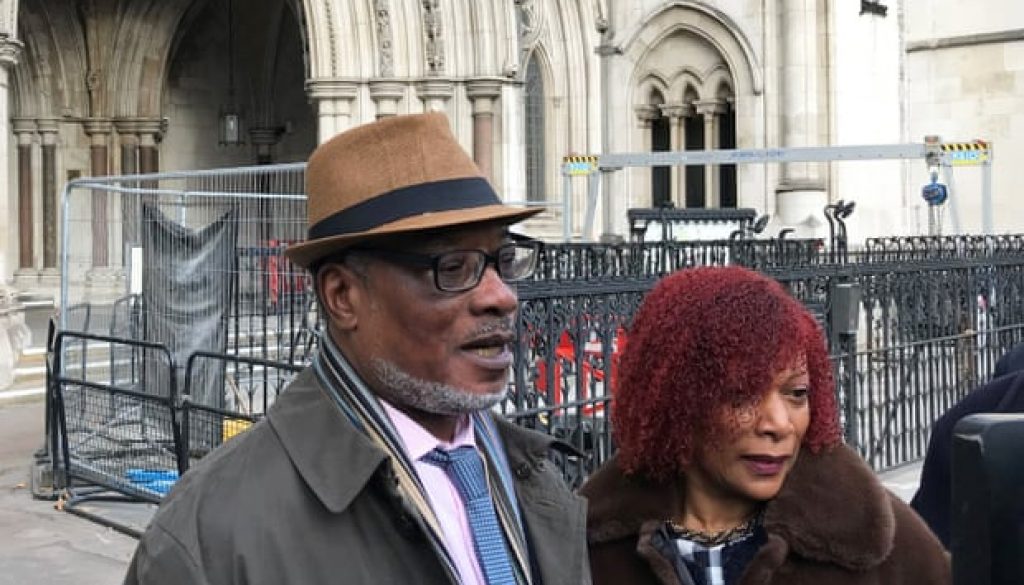Last of the Oval Four has 1972 conviction referred to Court of Appeal
Constantine Boucher, the last of the Oval Four to be exonerated, looks set to finally have his conviction quashed.
In 1972 Boucher, Winston Trew (pictured above), George Griffiths and Sterling Christie were convicted of theft and of assaulting police. Last year the convictions of Trew, Griffiths and Christie were quashed, after it was finally recognised that they had been the victims of police corruption. On learning of the exoneration of the other three, Boucher, who had left the country and could not be traced, himself contacted the CCRC. His case has now been referred to the Court of Appeal.
The Guardian carried the following article on 13 January. The original can be found HERE.
The final member of the Oval Four, a group of black men wrongly convicted of theft and assaulting the police in 1972 on the evidence of a corrupt officer, is set to have his name cleared.
Constantine “Omar” Boucher has been traced and will now have his case referred to the court of appeal, bringing to an end one of the longest-running cases of miscarriage of justice in British legal history.
Boucher, who was convicted along with Winston Trew, Sterling Christie and George Griffiths of mugging offences on the London Underground, contacted the Criminal Cases Review Commission (CCRC) after hearing that his three fellow defendants had all had their convictions quashed last month.
Previous attempts to trace him had been unsuccessful. He has been living in the United States.
“This is great news,” said Trew, 69, who has campaigned for many years for the convictions to be overturned. “Finally, it has come to an end. It is a new beginning for all four of us.” He said discussions were now taking place with a view to possible compensation for the false arrests and wrongful imprisonment.
The four were arrested at Oval tube station in south London by undercover officers led by DS Derek Ridgewell, who had previously served in the South Rhodesian – now Zimbabwean – police force. He was involved in a number of high-profile and controversial cases in the early 1970s, leading to calls for the home secretary to open an inquiry.
The men claimed that evidence against them was fabricated and they had been subjected to violence and threats but, after a five-week trial at the Old Bailey, all four were convicted in November 1972 of attempted theft and assaulting police. Christie was also found guilty of theft of a handbag.
All four were sentenced to two years in prison, reduced to eight months on appeal.
In 1978, Ridgewell himself was jailed for stealing mailbags and confessed to the governor of Ford prison: “I just went bent.”
Trew, Christie, both 69, and Griffiths, 67, had their convictions overturned by the court of appeal in December after a referral by the CCRC earlier in 2019.
The lord chief justice, Lord Burnett, expressed the court’s “regret” at the injustice and the length of time it had taken to remedy it.
The CCRC did not refer Boucher’s conviction to the court of appeal because it had been unable to locate him.
The watchdog said it had now done so on the basis that there was “a real possibility that the court of appeal will quash his conviction”.
Burnett said last month there was “an accumulating body of evidence that points to the fundamental unreliability of evidence given by DS Ridgewell … and others of this specialist group”.
The judge said it was clear the convictions were unsafe. “We would wish only to note our regret that it has taken so long for this injustice to be remedied,” he said.
Speaking outside the Royal Courts of Justice after that hearing, Trew urged anyone else who might have been wrongfully convicted as a result of Ridgewell’s misconduct to challenge their convictions. “They should come forward and contact the CCRC,” he said. “If you are innocent, don’t give up.”
Trew and Griffiths’s solicitor, Jenny Wiltshire of Hickman & Rose, welcomed the decision but said it was deeply concerning that it had taken so long.
Ridgewell was involved in several controversial cases, culminating in the 1973 acquittals of the Tottenham Court Road Two, two young Jesuits studying at Oxford University.
He was then moved into a department investigating mailbag theft, where he joined up with two criminals with whom he split the profits from stolen mailbags before he was caught and jailed, eventually dying of a heart attack in prison in 1982 at the age of 37.
In January 2018, Stephen Simmons’s 1976 conviction for stealing mailbags was quashed after he discovered Ridgewell had been jailed for a similar offence two years after his own conviction.

![16[2]](https://mojoscotland.org/wp-content/uploads/2024/06/162-1024x768-394x330.jpg)

